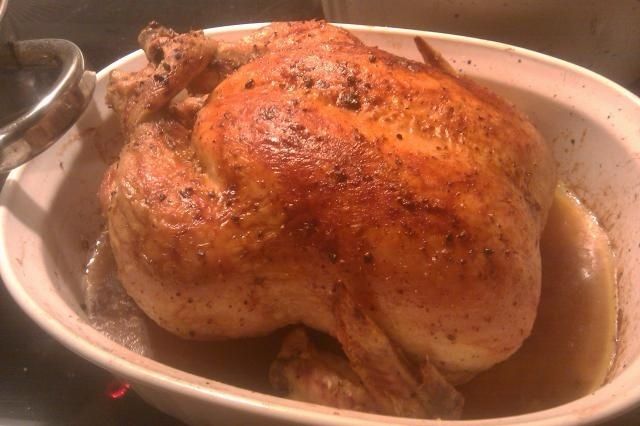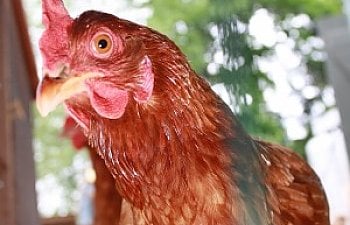As documentaries and news articles come out with the latest information about inhumane treatment of meat animals, or the newest outbreak of food poisoning, more and more chicken owners are looking to raising their own chickens for meat use. Many of these chicken owners aren't hunters, and possibly have never voluntarily taken a life of an animal for it's meat. Meat has always been pre-packaged in the perfect portion, with no face or anything other than perhaps a nice cartoon of a happy cow or chicken or farm on the label. As a society we are distanced from our meat, it's no longer personal.
Taking the step to become closer to your food source is a big step for many, and can be difficult. That is ok. Depending on your life and raising, you've been taught to never harm living things, but probably eat and enjoy meat.
I was personally raised with a close attachment to the critters that were destined to be dinner. I knew the cows, pigs, chickens and ducks, and it was just a fact that we raised them and would eventually eat them. They were livestock, and they were afforded the best care possible to give the best meat possible. They are living things and need to be cared for properly, even if they were going to be killed to eat.
When one begins the road to raising chickens for meat, just pound it in your head - you are a "farmer" now. You now have "livestock", not pets. Just like growing a garden, you are growing food for your family. They just happen to be more alive than a tomato plant, but in the end, they are food. The better care you give them, the better food they will give. Fresh air, fresh water, good food will all allow them to grow into a good product.
When it comes time to process, remind yourself over and over - this is what you raised them for. You can't eat a living chicken for dinner - your meat must be processed. Taking the BIG leap yourself to process is a hard one for many folks, but it's a rewarding one - once done, you've proven that you can complete the cycle of life and be able to "make" food for your family rather than relying on a store. At first, if you're not used to it, it's hard to take a living creature and transform it into food. It's a skill that requires resolve and backbone - there isn't any turning back. It's ok to feel bad at first - we're conditioned that way as a society to not want to take a life. It will get better through. It's not ideal to be completely blank about the process - for me, I don't feel "bad", I feel thankful for the food and the ability to provide good meat for my family. I'm thankful for each critter I process and I always mentally send it my gratitude for feeding my family. Each animal I kill - from a deer to a chicken, is important to me, and I'm grateful.
It's not about not being attached and treating them like things, it's about caring for them with the complete understanding of their purpose and end result. I like my Cornish cross meat chickens - they are amusing and funny. I talk to them, touch them, and spend time checking on them closely - it's good animal husbandry. Just because they are destined for dinner doesn't mean they should have zero contact and be avoided. Rather, it's our human mentality that needs to be changed to understand that killing an animal that isn't attacking you is OK. We have to remember that if we want to eat meat, an animal will die for that purpose,and it should be our duty as their caretakers to give them good care and a humane death. Somewhere with the advent of grocery store meat, we've lost that mentality - as a society. Taking the step to raise meat birds - or any other livestock meant for meat - if a hard step for many at first, because you're bucking years or even generations of teaching that you should never kill anything yourself.
A home raised chicken dinner:

Back to How to Raise & Process Chickens for Meat - Tips, Information and Pictures
Taking the step to become closer to your food source is a big step for many, and can be difficult. That is ok. Depending on your life and raising, you've been taught to never harm living things, but probably eat and enjoy meat.
I was personally raised with a close attachment to the critters that were destined to be dinner. I knew the cows, pigs, chickens and ducks, and it was just a fact that we raised them and would eventually eat them. They were livestock, and they were afforded the best care possible to give the best meat possible. They are living things and need to be cared for properly, even if they were going to be killed to eat.
When one begins the road to raising chickens for meat, just pound it in your head - you are a "farmer" now. You now have "livestock", not pets. Just like growing a garden, you are growing food for your family. They just happen to be more alive than a tomato plant, but in the end, they are food. The better care you give them, the better food they will give. Fresh air, fresh water, good food will all allow them to grow into a good product.
When it comes time to process, remind yourself over and over - this is what you raised them for. You can't eat a living chicken for dinner - your meat must be processed. Taking the BIG leap yourself to process is a hard one for many folks, but it's a rewarding one - once done, you've proven that you can complete the cycle of life and be able to "make" food for your family rather than relying on a store. At first, if you're not used to it, it's hard to take a living creature and transform it into food. It's a skill that requires resolve and backbone - there isn't any turning back. It's ok to feel bad at first - we're conditioned that way as a society to not want to take a life. It will get better through. It's not ideal to be completely blank about the process - for me, I don't feel "bad", I feel thankful for the food and the ability to provide good meat for my family. I'm thankful for each critter I process and I always mentally send it my gratitude for feeding my family. Each animal I kill - from a deer to a chicken, is important to me, and I'm grateful.
It's not about not being attached and treating them like things, it's about caring for them with the complete understanding of their purpose and end result. I like my Cornish cross meat chickens - they are amusing and funny. I talk to them, touch them, and spend time checking on them closely - it's good animal husbandry. Just because they are destined for dinner doesn't mean they should have zero contact and be avoided. Rather, it's our human mentality that needs to be changed to understand that killing an animal that isn't attacking you is OK. We have to remember that if we want to eat meat, an animal will die for that purpose,and it should be our duty as their caretakers to give them good care and a humane death. Somewhere with the advent of grocery store meat, we've lost that mentality - as a society. Taking the step to raise meat birds - or any other livestock meant for meat - if a hard step for many at first, because you're bucking years or even generations of teaching that you should never kill anything yourself.
A home raised chicken dinner:

Back to How to Raise & Process Chickens for Meat - Tips, Information and Pictures

